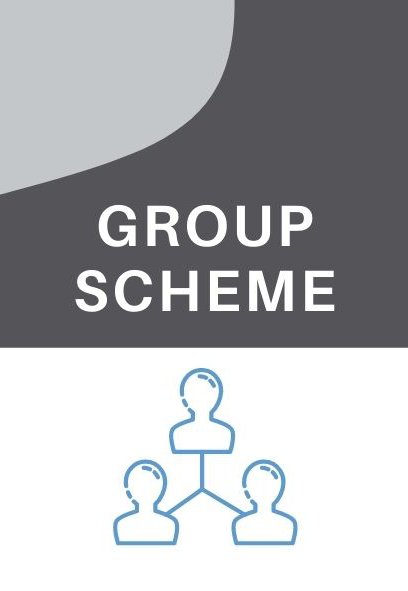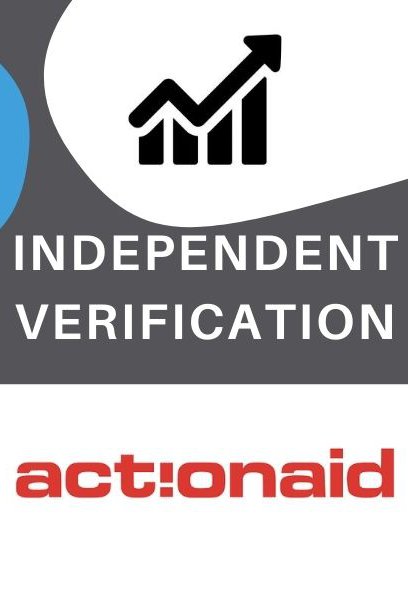ActionAid First Group to achieve Independent Verification
ActionAid First Group to Achieve Independent Verification
August 2019. This article was originally written and published by the CHS Alliance.
Congratulations to ActionAid, our first ever member organisation to become independently verified as a group! We’re lucky enough to hear from some of the organisation’s dedicated staff from across the ActionAid Federation.
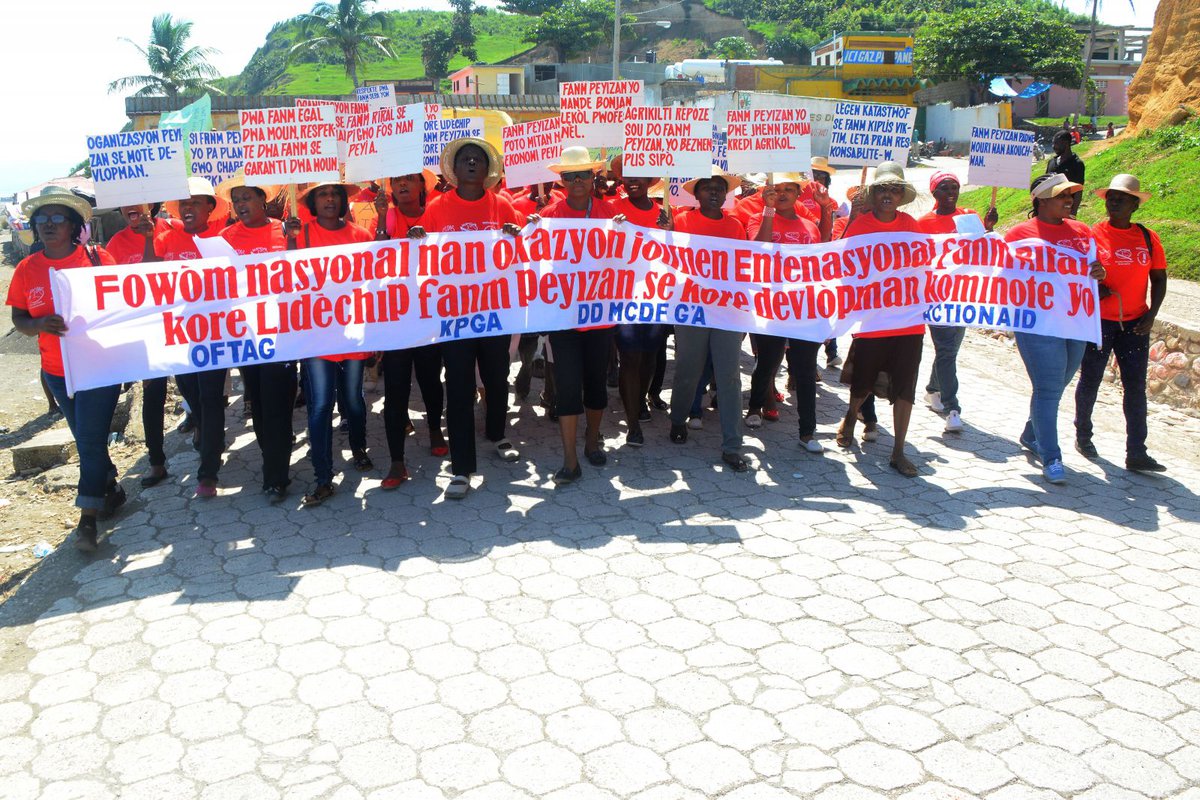
First of all, tell us a bit about yourselves?
Hi, I’m Debabrata Patra (DP), Regional Manager, ActionAid India. My commitment to quality and accountability stems from 1999 when I was involved in post-super cyclone relief and rehabilitation efforts in Odisha. I remember we introduced transparency boards and conducted social audits regularly. We were one of the first organisations to do that way back in 2000!
And I’m Clement Chesire (CC), the Humanitarian Response & Resilience Coordinator at ActionAid International Kenya. Accountability for ActionAid is not just a technical process. We are accountable in our programmes because it is part of our values.
Also joining the verification conversation are Sandra Bissereth (SB), Resilient Livelihood & Humanitarian Officer, ActionAid Haiti; Foday Kanyi (FK), Programme specialist Resilient, Livelihoods and Climate Justices, ActionAid International The Gambia; and Clare Bleasdale (CB) Global Accountability in Emergencies Advisor, ActionAid International Kenya, sharing the global perspective.
Nice to meet you all. Could you each tell us about ActionAid and its focus? How does the organisation work as a global network, with offices across so many countries?
CB, Global: Thank you. ActionAid is a global justice federation working to achieve social justice, gender equality and poverty eradication, and has a presence in more than 45 countries. We are delighted to hear that we are the first global group to be independently verified under HQAI’s group scheme and to share our experience. ActionAid’s humanitarian work includes women’s leadership, shifting the power, accountability to affected populations, with an overarching goal of building resilience.
CC, Kenya: I’d add that we at ActionAid are a unique partnership of people who join with community-based organisations to ensure positive changes to policies, programmes and practices. Our work focuses on issues of women’s rights; food security; education; governance and human security in conflict & emergencies.
DP, India: ActionAid draws from the unique strengths of our various country offices, yet we work as a coherent global network.
Have you found the Core Humanitarian Standard on Quality & Accountability (CHS) helps with ActionAid’s work?
SB, Haiti: Well, the commitments of the CHS have helped ActionAid improve the quality, efficiency and the effectiveness of its humanitarian response. By committing to the CHS, ActionAid is ensuring that affected communities are aware of their rights and are involved in all levels of the response.
DP, India: Also, the CHS summarises different standards into one coherent whole which make our task easy. For a beginner, the CHS is a very good orientation before any disaster response programme. For a veteran in the sector, the CHS also helps to revisit all the principles before, during and after a disaster response. During the disaster response, the CHS helps in improving the quality of programmes especially when the complaints come, and we address them properly.
CC, Kenya: Yes, and most importantly, the CHS puts the active agency of people living in poverty and impacted by disasters or crises first to build awareness on rights. This approach promotes programming that leads to community empowerment.
What did you learn from being independently verified against the CHS? How did you find the process? As you’ve undergone the process as a group did country offices support each other to get verified?
CB, Global: We learnt a lot… Following verification, ActionAid has already started making changes at a federation wide level. Although CHS verification does not cover the whole federation – we chose to go through CHS verification as a group of 16 ActionAid global members, ‘the ActionAid Global Group’ – learning and best practice will be shared widely to ensure quality and accountable programming throughout ActionAid.
During the process, we realised we needed to establish our ‘Group’ of members being audited more formally, making sure we had adequate quality control mechanisms in place, which we did. After this, the verification results were certainly useful as they allow us to reflect on how we can continually improve to deliver quality and accountable responses. The CHS verification report from HQAI was particularly useful as areas where we’re performing strongly were highlighted, as well as areas to improve. For example, we performed strongly against commitment four in that our responses are based on communication, participation and feedback. However, we need to look at how we evidence this and learn for future programming.
Quote: “Comparing our verification data against other organisations was also helpful, and we will continue to reach out to colleagues in the sector to learn from one another.”
SB, Haiti: And at a country level, CHS independent verification gives us better understanding of how to apply the principles of the CHS.
FK, The Gambia: Yes, the process is empowering and enhanced our skills through involvement in the real time self-assessment. Guidance from the global level really helped us with the verification.
SB, Haiti: Exactly, I felt that the process was done well, the country offices supported each other and shared information. So far, we continue to work together on our improvement plan to follow up on the recommendations that came out of the verification scheme.
CB, Global: We’re really committed to improving our quality and accountability, and there is an Accountability in Emergencies delegation (made up of ActionAid International, ActionAid Kenya and ActionAid UK) which is committed to supporting CHS compliance across the federation, and specifically facilitating the CHS independent verification process. A strength of the group is that it brings together a wide range of contexts, in order to share successes, challenges and learning.
How are you putting this newfound insight into practice? Have you found that the people and communities you work for react differently?
CB, Global: There has been a concerted effort to respond to the recommendations in the HQAI report. ActionAid remains committed to the CHS and has run a series of internal webinars on the CHS and what verification means for ActionAid. There is also a growing surge roster of people with accountability expertise, and the roll out of an accountability training programme.
SB, Haiti: Here, we are putting the CHS into practice through a cash distribution programme in response to food insecurity in the northeast. Working with a local partner, we sensitise partner teams and mediation committees on the CHS, ActionAid’s humanitarian work and on gender-specific issues. Sites are chosen according to a security criterion for right’s holders and we apply the principles of protection and respect for the dignity of the participants. Accountability mechanisms are in place, such as complaints mechanisms and also communities and participants are informed of the criteria and the cash they are received. We now see effective coordination and donors’ reports are produced on time.
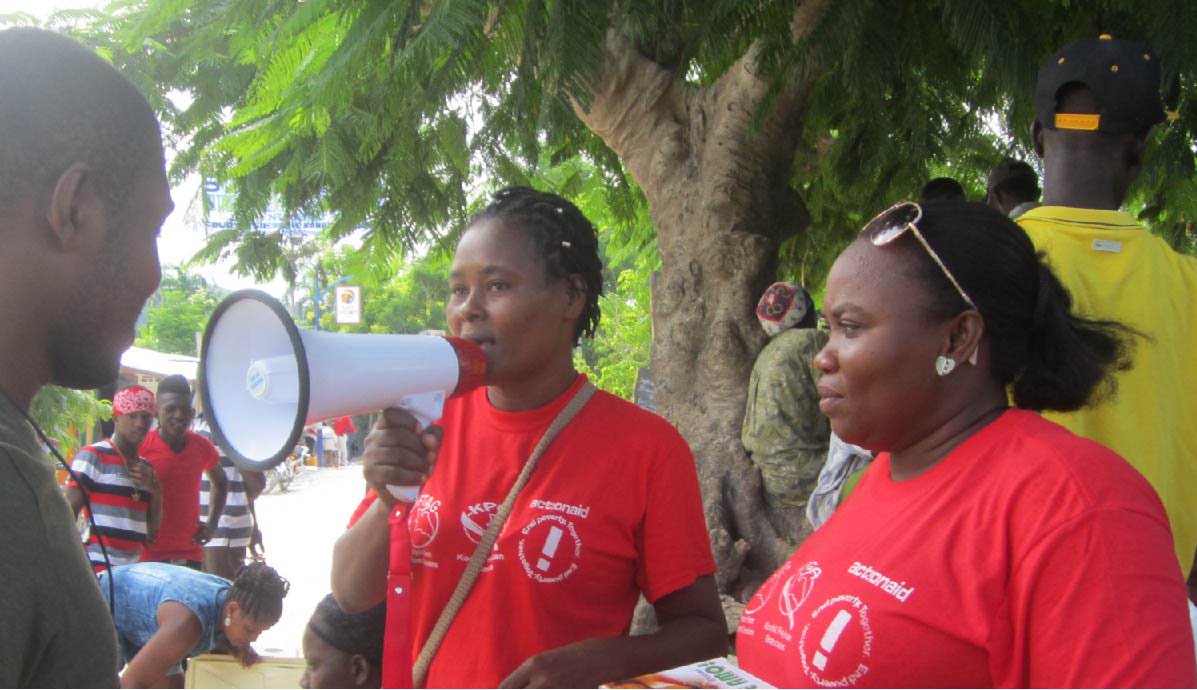
Quote: “The people affected are also more powerful now. Especially the women leaders that we work with.”
CC, Kenya: Yes, after getting the verification results we have strengthened our complaints and feedback mechanism starting with the recently concluded drought response in Baringo. We brought on board all partners and government agencies in the procurement processes to deepen accountability, increase coordination and placement of resources and reduce duplication. We ensured partners had complaints registers and sensitised on how to escalate complaints if feedback is not satisfactory.
DP, India: CHS verification has given us a new responsibility. During the last Fani and Titli cyclones in Odisha, the government announced several compensation packages for vulnerable survivors. However, we noticed most of the schemes did not reach people that really needed them. In our last citizens’ report after the Phailin cyclone, we also found that compensation packages were not reaching people due to bureaucratic hurdles. So, during the recent Titli and Fani cyclones, we worked closely with the local administration to make sure that the compensation packages reached the most vulnerable survivors.
Quote: “We’ve also seen a great reaction from the communities we serve. In fact, the amount of opportunities we give to the community to vent their grievances and share their opinion often surprises them! Other players in the field just come and distribute the relief and go.”
But ActionAid and our partners’ presence are long term, so we can ensure people’s rights and entitlements. In the Fani response for instance, people were surprised we talked of land rights during a crisis. Yet this was a key issue for securing housing and holding duty bearers to account.
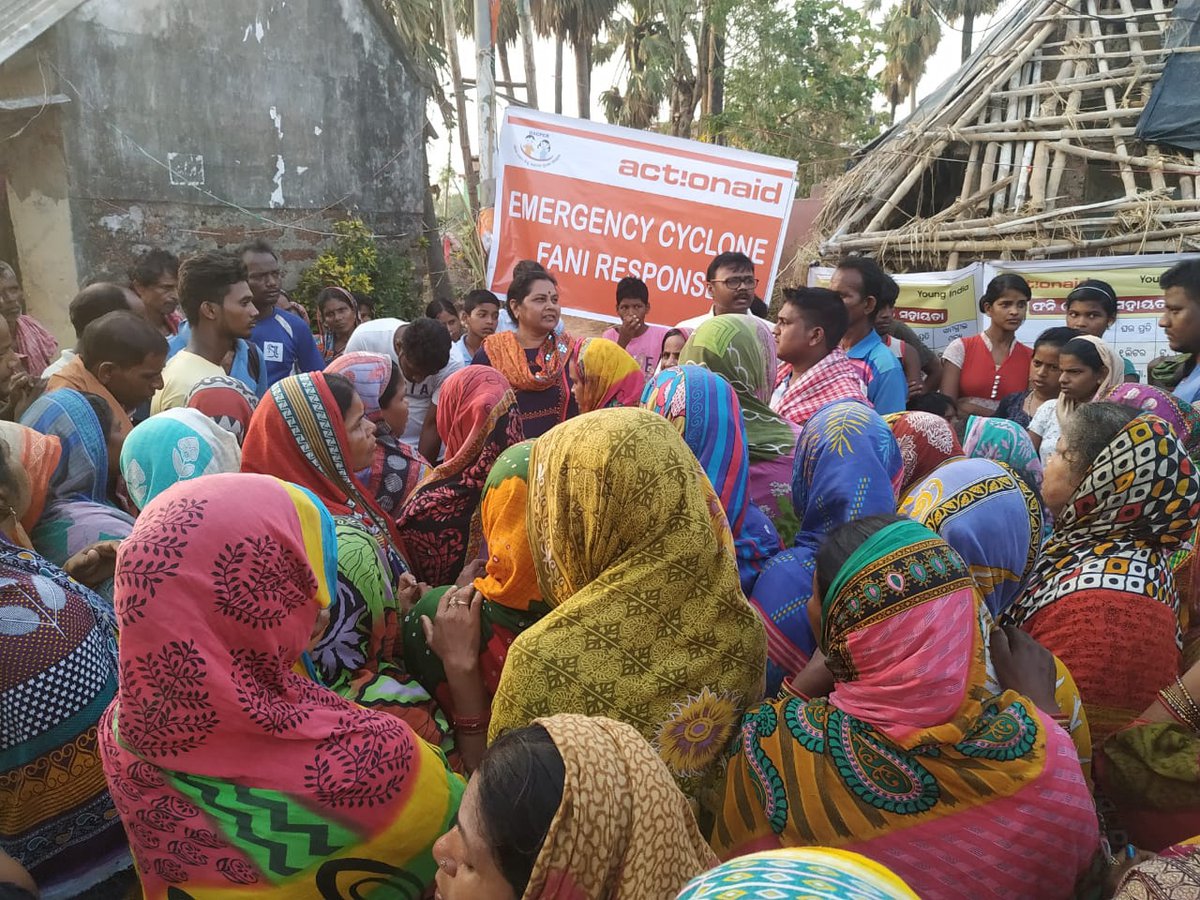
As you partner with local and community-based NGOs, how do you ensure quality and accountability even where you are not leading responses?
CB, Global: Shifting the Power is core to ActionAid’s humanitarian work. ActionAid members work closely with partners, and there are capacity assessment tools, as well as training sessions to highlight our commitment to accountability in emergencies.
CC, Kenya: Here in Kenya, we work with women-led Relief Committees, Community Disaster Management Committees and Women’s Networks as partners in delivery of humanitarian assistance. The committees and networks are made up of affected people who live in the community, and they are elected by the community. ActionAid recognises emergencies as opportunities to give women a chance to take on leadership roles. These women’s institutions have received essential trainings on needs assessments, targeting, accountability processes, protection and influencing.
Do you feel that donors recognise the value and efforts that go into improving quality and accountability?
FK, The Gambia: For us, independent verification against the CHS helps demonstrate the effective use of humanitarian funds and resource mobilisation. It also creates confidence and trust in entrusting funds to ActionAid for our work reaching out to the most vulnerable affected people.
DP, India: Yes, donors recognise our efforts. But we now want to collect case studies highlighting the positive effects of adhering to the CHS commitments, maybe some comparative studies or stories of change.
Looking to the future, how do you think we in the humanitarian and development sector can collectively improve quality and accountability in our work?
SB, Haiti: To improve our work, we must always listen to the communities and make participatory evaluations to determine the real needs. We must also work and develop local partnerships and seek more synergy with other organisations. Mechanisms of accountability and feedback are also important to meet the expectations of participants and to improve the quality of programs. We must make sure that local actors, including women’s organisations, are at the centre of our response. We must continue to advocate for the localisation of the humanitarian aid.
CC, Kenya: I agree, we should enable local organisations through capacity development to lead the delivery of quality and timely humanitarian responses. We must also link humanitarian and development work. For example, the connection between good governance and accountability and the delivery of gender responsive public services.
DP, India: We must highlight the need to practice CHS principles in a disaster response or, for that matter, any developmental work. We need to have more comparative studies to show the efficacy of applying CHS principles. We must push for the attitudinal and behavioural change required to practice the CHS. We must always give respect and dignity to survivors in any disaster response.
Quote: “We must also influence the biggest players in the sector – such as governments – to adopt the CHS.”
As a last thought I’d say that although the CHS covers both humanitarian and development work, I think this needs to be understood and promoted more. The CHS is applicable to all programming.
Many thanks to all ActionAid Group Members for their engagement and input. For more information on ActionAid’s work, please contact Pascaline.Kangethe@actionaid.org & Clare.Bleasdale@actionaid.org.
Here is the link to the original article by the CHS Alliance.
Category
